Mosuang Island, New Hanover.

Lochmarin
Tue 20 Sep 2016 04:04
02:26.177S 150:21.163E 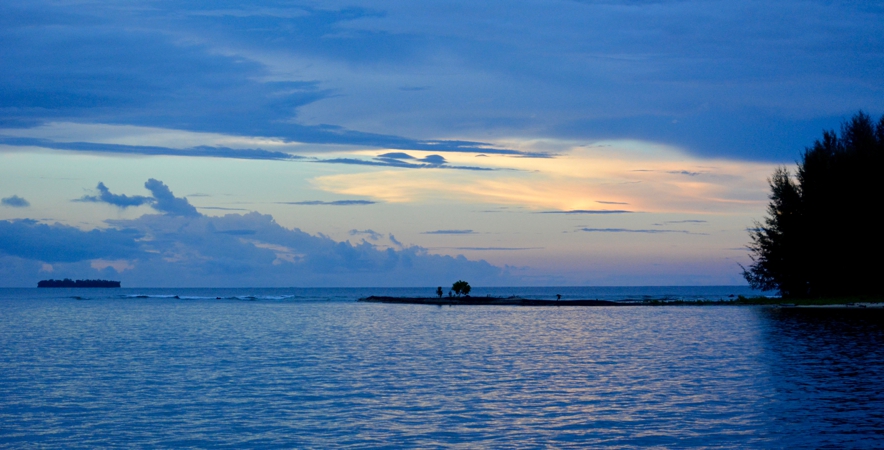 Evening light looking North across Mosuang Island reef. The island on the left is a motu on the outer reef. 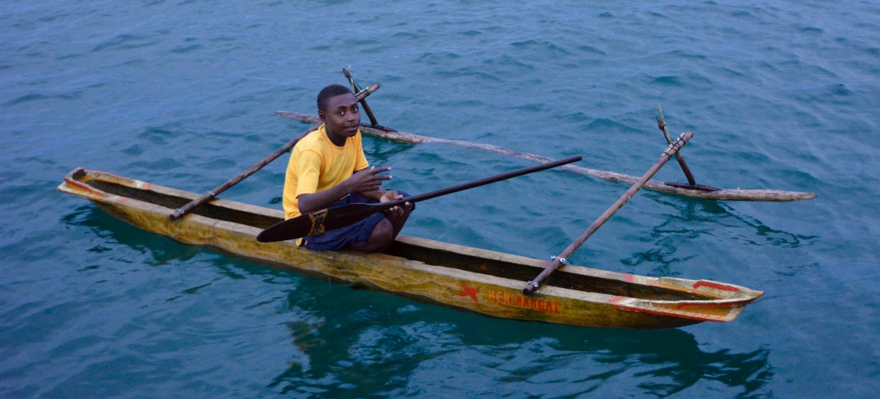 Peter. The canoes here were very different: much thinner with flanges along the top to sit and stand on. Eventually the steady stream slowed and we were able to collect ourselves, eat some breakfast and take the kayak ashore. Amongst the throng two folk had stood out: Beatrice, a delightful 14 year old girl with good English and a gentle manner, and Peter, one of the first young men to paddle out the evening before, flashing his smile at us in the dusk. Peter came out in the morning again, not to trade, just to see us, but he hung back, kept a polite distance and didn’t beg for things. They both kept us company when we met with Chief Peter and had a look around the village, and Beatrice introduced us to her Grandmother, Anastasia, who, with Robin, Beatrice’s brother, came back out to Lochmarin with us when we’d finished our village visit.  Robin, Beatrice and Anastasia on board. We got on like a house on fire, chatting and enjoying each other’s company. Anastasia told us of her time in school with an English teacher, who kept her on as a housemaid after she had graduated. The teacher now lives in Plymouth and Anastasia regretted not having been able to keep in touch. After an hour or so it was time for them to leave but we invited them to return in the evening to talk some more. All the time we were talking more canoes were around the boat, just hanging out watching, wanting to be a part of things, or waiting to trade when our guests had left. We were almost starting to get used to having an audience. Then, thankfully, the last of the canoes paddled away and we were left in peace for a few hours. I think there’s a chicken and an egg thing happening here. A yacht only comes once or twice a year so the folk are very keen to trade and meet the newcomers. However, they are so overwhelming that I would imagine that most yachts would move on pretty quickly, so the villagers all come as soon as they can, in order not to miss the short staying yachts, which makes them more overwhelming, which makes the yachts move on quicker… We headed over to the uninhabited island of Mosuang to burn our plastic rubbish on the reef* and go for a snorkel, meeting two fishermen on the way who were also snorkelling the reef - not to see the anemone fish and beautiful coral, but to find food: clams, octopus, reef fish. They passed by our boat when they were finished to offer us an octopus, which we were happy to trade for. They wanted some movies to watch - they have a DVD player on shore. Phil gave them season one of Game of Thrones - along with warnings about the sex and violence and to keep them away from pikininis. I’m not sure quite what they’ll make of it but it’s a pretty cool exchange for an octopus! Phil cut up and beat the octopus then I put him on to cook whilst our visitors arrived. 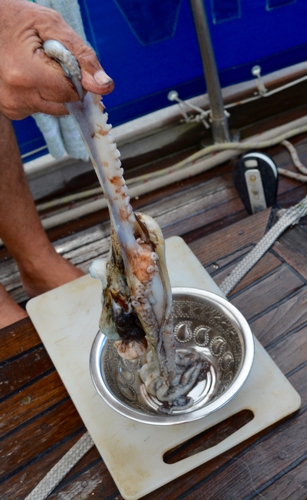 Yummy! Strangely, Beatrice and her family didn’t come as expected, but when the other guests had left and we were about to make ourselves some food and get some rest after a very busy day, Beatrice and her father arrived. They had been waiting for our guests to leave as they had an important mission. They had come, bringing a ceremonial gift of a superb shell money necklace 6 foot long, as representatives to ask us to accept the honour of becoming part of their family, part of the wantok. We would be Beatrice's second parents, rather like Godparents, with the privilege and responsibility of doing what we could for her. This was a huge honour, not lightly given and, of course, with goosebumps and wonder, we were delighted to accept. 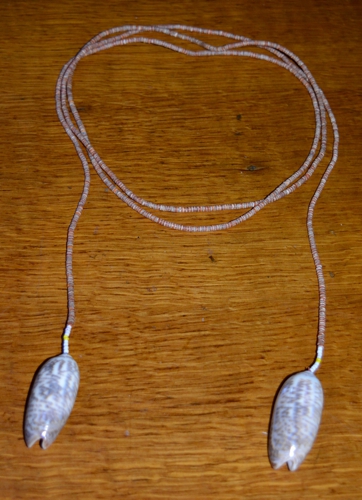 Shell money necklace, made from hundreds of tiny discs cut out of shells and sanded smooth. Next morning Beatrice and her grandfather came with sun up to spend what time they could with us before we had to leave. We had smoked salmon and scrambled eggs to celebrate our new bonds, Beatrice helping to cook in the galley, and, having thought carefully about what we should give our new daughter, we presented Beatrice with a little silver necklace and, to her delight, a mobile phone along with credit vouchers. Well, our other daughters had all been given mobile phones when they were teenagers, this one should have one too! It also meant we’d be able to keep in touch when we got signal as long as we were in PNG. So, when we set sail, less than two days after we arrived, our trading stores were considerably deleted, our fruit and veg stores replenished, and our were hearts were filled to bursting. 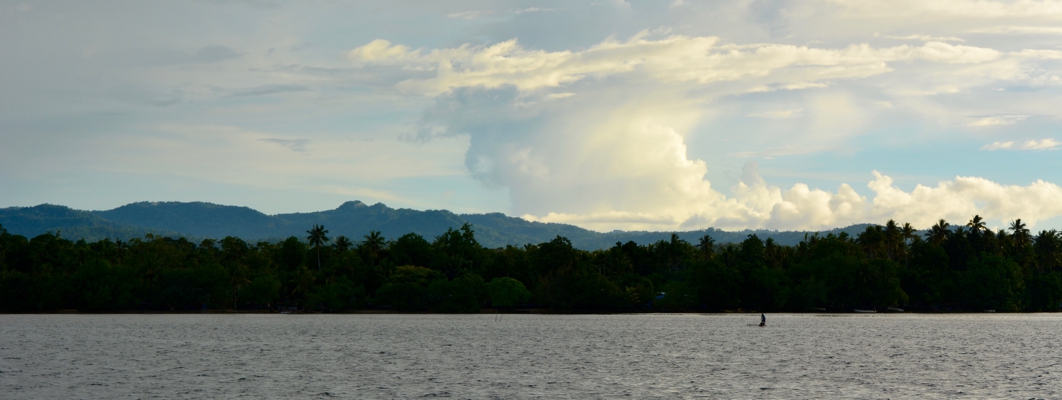 Looking across the bay to the main land of New Hanover, the last canoe heading home. *All organic can go over the side, tins and glass can go over in deep water as it will corrode to nothing or be transformed to clear pebbles before it reaches land, but plastic must be kept out of the sea. Reusable tubs and bottles the villagers like for storing things in, but the little bits of broken plastic bags, plastic tops to glass bottles etc still remain. The only option is to burn it as there’s no recycling available. |